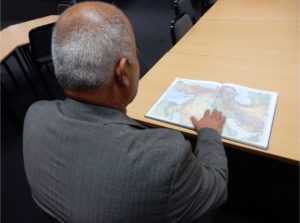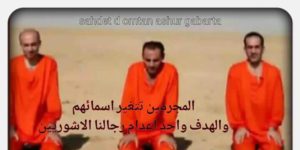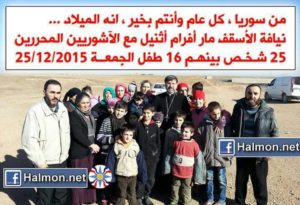Surviving ISIS – a refugee’s story
Syrian refugee ‘George’ survived a year as a captive of ISIS treated brutally, constantly threatened with death and not knowing the fate of his wife and daughter.
Now safe and living in Melbourne’s north, ‘George’ has told of his incredible ordeal in the hope that the international community increases its efforts to help the millions of refugees who have not found a safe place to rebuild their lives.
“I was fortunate to survive and to find a safe place to live with my family. But there are many, many people who are still in very difficult circumstances even though the threat of ISIS has gone,” he said this week.
‘George’ – not his real name – shared his story through an interpreter on the proviso that his identity and details about his life not be revealed to protect the lives of family members still in Syria.
A professional, who studied at Damascus University and then in Europe and returned to Syria in 1995, George is from a small village of 400 people about 30 kilometres from the city of Al Hasakah in northern Syria.
It is one of a string of 33 small Assyrian Christian villages along the Khabur River, close to the border with Turkey, that were once home to about 20,000 people.
George said that as the conflict in Syria escalated in 2014 the security situation in his area began to deteriorate.
Even listening to George through an interpreter, his understated, sometimes humours tone betrays a quiet courage and gentle humility.
“Sometimes I could get to work, sometimes I couldn’t,” he said
“We knew things were getting worse when the army started to withdraw from the Al Hasakah suburbs,” George said.
Then, early on the morning of February 23, 2015, ISIS attacked the villages.
Heavily armed ISIS fighters stormed his village just after 8am.
“There were 200 of us captured by ISIS including all of my family members. They put us in a house in the middle of the village and started to threaten us with guns and shout at us,” George said.
“They said to us you are kafir (unbelievers) and this is not your land… they asked us who gave us permission to build churches,” he said.
“We stayed for six hours in this house. We were full of fear and we didn’t know if they were going to kill us. Every moment we thought ‘maybe they will kill us now’,” George said.
The villagers were put into trucks and the ISIS fighters tried to take them to a mountain base 30 kilometres away but the column was attacked by Kurdish militia and forced to retreat back to the village.
After spending a night crammed in the house and having to sleep standing, the group was finally transferred to Mt Abdul Aziz, a fortified ridge controlled by ISIS.
“At this point we – the men – were separated from the women and children. This was the worst moment for us we didn’t know what would happen to our women and children,” George said.
The men were put in closed trucks and taken to the town of Al Shadada.
“We couldn’t see anything, we could hardly breathe and there were shots being fired around us,” George said.
“When we arrived at the town, we were put in a prison and the ISIS men took everything we had – ID, money, everything. And they started asking us about our names.
“At that moment we didn’t know what was happening or whether we were going to die or not,” George said.
The men were placed in a house under guard – thirty people to a room.
“When I got to the house I was surprised to see people from other villages there too. There were around 300-350 of us,” George said.
“But we still didn’t know what had happened to our women and kids and didn’t see them for three months,” he said.
George said that Muslim clerics told men that they must convert to Islam or they would be killed.
The joy of finally being able to see their children after three months was tempered when they learned that one 15-year-old girl had been taken away and ‘given’ to the local ISIS Sheikh.
“To this day we do not know what happened to this girl. I knew the girl and her family because they lived in a nearby village.
“When we saw our kids they did not recognise us because we had been forced to grow long beards. When they saw us they asked ‘are you ISIS’?” George said.
George came to the conclusion that he and the other Christians were being used as a bargaining chip.
“We knew they had killed a lot of people so during this time we didn’t know what they wanted from us. They said they wanted something and if they didn’t get it they would kill us,” he said.
“Every day we grew more fearful that we would die. And thought that if ISIS didn’t kill us we would die from the shelling and bombing that was going on overhead,” George said.
He said that as time went by the conditions under which the men were being held worsened.
“There were 150 of us in one small house with one bathroom and one toilet,” George said.
“Were given a little food – just bread and vegetables we had to cook,” he said.
George said he began to recognise the accents of his ISIS guards and was surprised to discover the international nature of the group.
“There were Tunisians, French, and Saudi Arabians. The local Prince was an Iraqi,” he said.
“We were all very scared of these men. They looked scary and they were fanatics. They told us they believed that each time they killed a Christian, they would get to paradise.”
George said in the fourth month of their captivity, the men were moved to a house closer to the front lines.
“It was a very dangerous area. Above our apartment we could hear voices and many different languages,” he said.
“There was shelling and shooting and aircraft going over all of the time. It felt like they were shooting at us. We heard explosions but we didn’t know what was going on.
“After 20 days in this place a group of people – a committee – came to ask questions about who we were, what we thought about the government – if we were with or against the government – if we knew our destiny.
“They said that Sharia law said that our destiny was Islam or death.
“We told them we were peaceful, not with or against anyone and that we were not armed,” George said.
At this point the men were given an ultimatum to convert to Islam or die.
“We never discussed it as a group but each man said that he would rather die than convert to Islam,” George said.
“This was the worst moment. After the committee talked to us, a group of armed men came in led by a Tunisian who told us to get ready to die.
“He insulted us and swore at our religion. Then we were taken one by one to another room where they searched us and threatened us,” he said.
George said the worst moment of his captivity came when ISIS picked six single men and took them away.
He said the three men Bassam, Ashour and Abdalmasaya – all of them his friends – never returned.
“Bassam and Ashour were very kind people who helped the older men in our group. Some of the group were paralysed and they helped feed and bathe them,” George said.
“Abdalmasaya was a doctor who used to treat and help people who got sick in our group. He was the most optimistic of us and he was always telling people we would be set free soon,” he said.
George said the three men were shot and killed on Eid night.
“We learned later they were made to wear orange jump suits and taken out in a car and driven for an hour,” he said.
“ISIS told them not to worry, that they were just filming a frightening video and not going to kill them.
“This is what ISIS tell people to keep them calm. But they shot our friends. However, Ashour didn’t die immediately so they put them in a grave and shot him again.
“The three others were made to watch this happen and they were told they would be next if they didn’t obey their captors,” George said.
After this incident, the men were moved to Raqqa and it was here after six months that they gained the first inkling as to what had happened to their families.
ISIS were shuffling prisoners around buildings in Raqqa as the areas they controlled shrank in the face of advances by the Syrian army and militia groups.
George said the women and children had been held in a part of the prison that the men later occupied.
“Some of the women left behind signs that they had been there. It was very clever of them. We could tell they had been there because they left personal items that some of the men recognised. We knew they were safe and we were very relieved to know they were still alive,’ he said.
As the fighting closed in around Raqqa, the threat of death at the hands of ISIS or as a result of shelling loomed larger.
“The building the prison was in was shelled many times and we feared that if ISIS didn’t kill us the shelling would,” George said.
“At this time we could hear ISIS torturing people somewhere in the prison. There were screams – usually after midnight,” he said.
“They didn’t torture us and after three or four moths they said they would set some of us free but we didn’t know if they were lying to us.
“But then they started setting groups of people free and my turn came in January 2016. I was among the last,” George said.
After 11 months in captivity living constantly with the threat of death and fearful for the fate of his family, George regained his freedom.
“They blindfolded us and put us in a van. At the time we didn’t know what had happened to the people set free before us so we thought we were going to be killed,” George said.
“But when we got to this place, there was a bus waiting for us. We were five men, seven women and some children and we were free,” he said.
George learned his wife and daughter had been set free 20 days earlier. He was taken to the town of Tall Tamer and reunited with his family. He has never returned to his village.
He and his family spent a month in Tall Tamer living with cousins. When he managed to obtain a new passport, the family left for Lebanon.
After six months in Lebanon, the family was granted a humanitarian visa by the Australian embassy in Beirut and they arrived in Melbourne a year ago.
George says that no one among his fellow captives has returned to their village but that the bonds formed during their desperate times remain strong even though the group is now spread across the globe.
“My personal story is also a group story,” he said.
“I got very close to my fellow captives we used to help each other. For example, the young people encouraged the older ones, telling them not to worry, and the older people gave us advice and wisdom,” George said.
He said that it was his wish to see his daughter grow up that kept him alive through the ordeal.
“If you put someone even in a hotel for a couple of months, they’ll go crazy. What kept me sane in captivity was the thought that I had to live for my daughter,” George said.
And he said that he always harboured a sense of destiny about his survival. He is the third generation of his family to have had to flee their homes.
“My grandfather fled from Turkey to Iraq during the Armenian genocide in 1918 and my father fled the Simele massacre in Iraq in 1933. So I always knew our family is a family of survivors,” George said.
Safe in Melbourne, George is now looking to the future. He hopes to resume his career and says his daughter is doing well in school.
“We are grateful to be here and to have safety. It is a good life in Australia and my daughter is very happy in her school. We hope for a better future for her,” he said.
And asked about his captors and killers of his friends, he says he forgives them.
“I can’t hate anyone. I took the quote from my friend Abdalmasaya. He wrote a note to his killer – as Jesus Christ did – saying ‘I forgive you’,” George said.
Laurie Nowell
AMES Australia Senior Journalist












